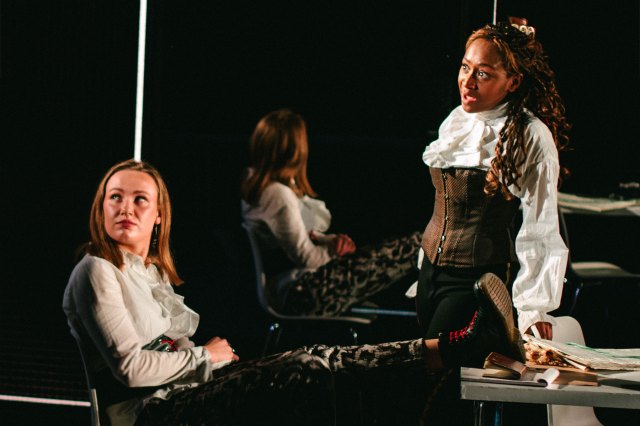Jekyll and Hyde at the Lowry and on tour – review
The National Theatre production is now touring secondary schools across the country

Whatever people say about critics, the real cut-throat audience members are children. They’ll go with you if you engross them, but are brutally – vocally – unforgiving if you don’t.
If anyone can delight them, it’s the National Theatre, creators of spellbinding touring work for younger viewers, like The Curious Incident of the Dog in the Night-Time and The Ocean at the End of the Lane. The former visited schools across the country as part of an annual programme. This is the first year they’ve opened those performances to the public, but it’s with a piece that goes the other way.
Jekyll and Hyde picks up after Robert Louis Stevenson’s novel. Henry Jekyll has died after his destructive experiments, which his wife, Harriet, is keen to complete – emboldened by her husband’s scoffing, sexist colleagues. It could be an interesting idea – a woman reclaiming her husband’s legacy through her own headstrong intelligence – but the plot carbon-copies his journey of reckless dabbling that presents her as no more of a genius.
Evan Placey’s adaptation seems principally focused on making it a feminist revenge tale. Hyde targets corrupt, misogynistic male authority figures. Despite the reorientation, though, the female characters feel limited and underwritten.
The book’s presentation of restrictive, conservative social forces – morality, religion and science – is more interestingly developed by referencing the policing and abusing of women’s bodies. The set’s grate partitions literally cage and pen women in. Placey also retains some of the gothic macabre detail, such as a hair fork used as a dagger, its teeth sinking into victims’ necks.
There’s wit, too, when Harriet follows the men’s advice to stick to “needlework” by injecting herself with the syringe. Hyde’s takeover is nicely rendered through Benjamin Grant’s fibrillating music and Joshua Pharo’s flickering lighting, while bodies fall back as though undergoing metamorphosis.
Angela Jones announces “Lady Hyde has arrived” but she never does. Her voice remains weak and flat, pitch unchanged. Her performance lacks the slightest suggestion of transformation; the costume does all the work.
Hyde’s isn’t the only unwelcome arrival. The story is suddenly hijacked by a modern-day police drama, where a young woman is arrested for blogs that echo a series of murders. While it updates the detective investigation element of the story, it’s leaden and tramples the eeriness, muddling its own potions.
Like Jekyll’s counterpart, it’s also rough and blunt. Images such as a man praying with uninhibited dancing behind him make metaphors clear for young viewers, but it presumes they’ll only understand its themes if they’re bellowed at them in the most simplistic terms. It becomes particularly worthy with scattergun monologues that pelt us with every social justice issue, including gender pay gaps, LGBTQ rights, racism and police failure.
The source doesn’t withstand Placey’s heavy-handed reworking to make it fit the template of the V for Vendetta parallel. And the extra split in the storyline scrambles narrative clarity. Just as Jekyll is a cipher for Hyde, the girl becomes a ventriloquist for them, while herself being a Hyde-esque vigilante. It also creates a schizophrenic tone that director Kirsty Housley can’t stabilise.
It’s itself a reinvention gone wrong. As unforgiving laughter grows from the students in the audience, it seems to have fallen short of the initiative’s purpose to stage illuminating, accessible versions of syllabus texts. “I want you to imagine you’re a secondary school student,” we’re asked at the start. I imagine I’d be pretty confused.
















